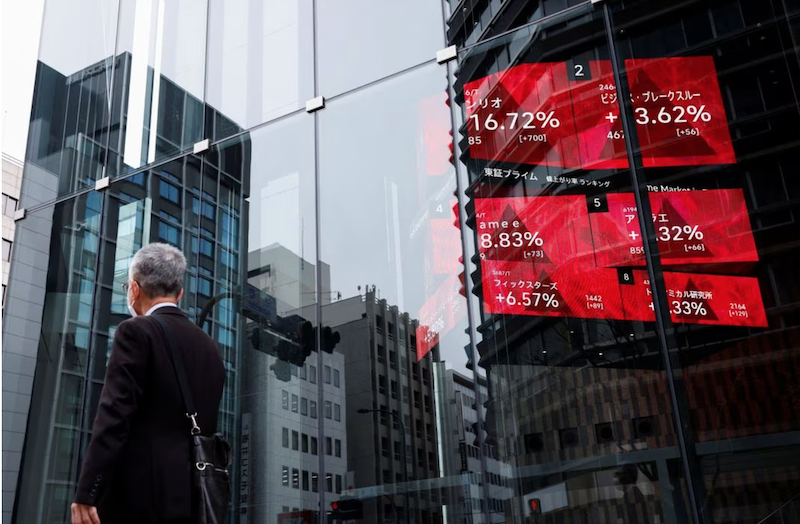Asia’s major markets saw a mixed start to the week with investors uncertain about the likely effectiveness of Beijing’s latest raft of policy support measures for its markets and ailing property sector.
Mainland China traders were the most optimistic but that upbeat mood wasn’t replicated in Hong Kong or further afield.
China’s financial regulator on Sunday reduced the risk weighting it attaches to insurance companies’ holdings of blue-chip shares and tech stocks.
Also on AF: China’s Economic ‘Crisis’ Makes Taiwan War Less Likely: Biden
From Monday, investors will now be allowed to borrow more money from brokerages to buy stocks using the same amount of collateral, with the move expected to inject roughly 400 billion yuan ($54.70 billion) of fresh capital into the market.
The Shanghai Composite Index rose 0.84%, or 26.06 points, to 3,142.78, while the Shenzhen Composite Index on China’s second exchange edged up 0.90%, or 17.37 points, to 1,952.91.
But Hong Kong-listed mainland developers slumped more than 3% on signs property sales in China remain sluggish. New home sales in China’s first-tier cities slumped 45% by area during September 1-7, according to Haitong Securities.
Sun Hung Kai Properties slumped 9.4% after the Hong Kong property giant reported a 17% decline in underlying profit for the year ended June.
The benchmark Hang Seng Index dropped 0.58%, or 105.62 points, to 18,096.45 with the Hang Seng Tech Index losing 0.21%.
Japan’s Nikkei share average gave up early gains on Monday to close lower, as a report flagged a possible early end to the Bank of Japan’s (BOJ) negative interest rate policy.
The Nikkei fell 0.43% to close at 32,467.76 after rising as much as 0.4% earlier in the session, while the broader Topix was ahead 0.06%, or 1.46 points, to 2,360.48.
BoJ Interest Rate Signals
In an article in the Yomiuri newspaper published over the weekend, BOJ Governor Kazuo Ueda said the central bank could end its negative interest rate policy when its 2% inflation target was in sight, signalling possible rate hikes.
The Tokyo Stock Exchange’s banking index jumped 4.69% in its sharpest daily gain since December 20 and was the top gainer among the 33 industry sub-indexes.
Elsewhere across the region, in earlier trade, Sydney, Singapore, Taipei, Manila and Jakarta were also down, though Seoul and Mumbai posted small gains.
MSCI’s broadest index of Asia-Pacific shares outside Japan reversed earlier losses and was up 0.3%, after US stocks ended the previous session with mild gains.
A more positive tone was seen across futures markets which pointed towards a better start for most major European indexes. In early trades, Euro Stoxx 50 futures were up 0.26%, German DAX futures were up 0.17% and FTSE futures were up 0.29%. US stock futures, the S&P 500 e-minis, were up 0.24% at 4,472.3.
In the United States, the Consumer Price Index (CPI) for August, due out on Wednesday, is expected to rise 0.6% month-on-month for August, which would take the year on year rate to 3.6%, according to a Wells Fargo research note.
Investors are pricing in a 93% probability that the Fed will keep rates at current levels after its next meeting ends on September 20 but only a 53.5% change for another pause at the November meeting, according to CME group’s FedWatch Tool.
The yield on benchmark 10-year Treasury notes rose to 4.294% compared with its US close of 4.256% on Friday. The two-year yield, which rises with traders’ expectations of higher Fed fund rates, touched 4.9948% compared with a U.S. close of 4.984%.
Yen Strengthens Against Dollar
The yen appreciated sharply against the dollar after Bank of Japan governor Kazuo Ueda stoked hopes the central bank could soon see a shift away from negative rates.
The dollar on Monday dropped 1.12% to 146.16 yen and it remains some way off its high this year of 147.87 reached earlier this month.
The dollar index, which tracks the greenback against a basket of currencies of other major trading partners, was down 0.23% at 104.61.
China’s central bank yanked the yuan off a 16-year low against the dollar on Monday by setting a daily midpoint guidance rate with the strongest bias on record, signalling increasing discomfort with the currency’s recent weakness.
In the spot market, the onshore yuan was changing hands at 7.3245 per dollar at 0210 GMT, after hitting 7.3510 on Friday, which was 6.1% down from the start of the year and a level last seen during the global financial crisis.
US crude dipped 0.19% to $87.34 a barrel. Brent crude shifted into positive territory to be up 0.2% $90.80 per barrel.
Spot gold was trading slightly higher at $1,927.08 per ounce.
Key figures
Tokyo – Nikkei 225 < DOWN 0.43% at 32,467.76 (close)
Hong Kong – Hang Seng Index < DOWN 0.58% at 18,096.45 (close)
Shanghai – Composite > UP 0.84% at 3,142.78 (close)
London – FTSE 100 > UP 0.45% at 7,511.94 (0933 BST)
New York – Dow > UP 0.22% at 34,576.59 (Friday close)
- Reuters with additional editing by Sean O’Meara
Read more:
Major Chinese Cities Lift Home Buying Curbs to Aid Developers
Deflationary Pressures on China Ease, But Demand Still Weak
Nikkei Dips on iPhone Ban Fallout Fears, Storm Shuts Hang Seng
























